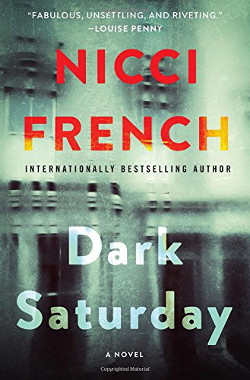
Dark Saturday by Nicci French is the sixth Frieda Klein novel—an electrifying, sophisticated psychological thriller about past crimes and present dangers (available July 11, 2017).
London-based psychotherapist Frieda Klein has all but sworn off working with the police, and her friends and family have encouraged it as well. It’s put her and others in danger, and she’s determined that no one else will get hurt. Unfortunately, her instincts—and now her circumstance—seem determined to keep her involved. When she’s contacted by a man named Walter Levin, she’s sure he’ll ask for a favor. After all, she owes him one. And he does:
“Good,” said Levin. “We’ve finally got to that. It’s really very simple. We just want you to go and talk to someone, then tell us what you think.”
“I think I’m here under false pretenses,” said Frieda. “I’ve no special skills. I’m not a detective. I’m not an interrogator.”
“The woman in question is clinically insane,” said Levin. “That’s not a comment. That’s her diagnosis. We sent someone to interview her.”
“Me.” Keegan leaned back and folded his arms. To Frieda he looked like an illustration in a psychology textbook: folding of arms demonstrating emotional withdrawal, self-defence bordering on hostility.
“He couldn’t get any sense out of her,” said Levin.
“You can say that again.” Keegan gave a snort.
“Who is this woman?”
“It might be interesting if you come to her fresh, as it were,” said Levin.
“She killed her family,” said Keegan.
[…]
“Is there something particular that you need to find out?”
“The woman is trouble,” said Keegan. “And she’s dangerous. What we want to know is whether she’s going to be trouble to us. As far as I can tell, she’s completely out of it. The question is whether she’s going to start making sense and saying she’s been wrongly convicted.”
When Frieda arrives at Chelsworth Hospital, she’s not sure what to expect and is immediately horrified at Hannah’s condition.
The first thing that struck Frieda was her size. Even stooped as she was and draped in thick layers of clothing, Hannah Docherty was obviously tall and solid, with broad shoulders and large, almost mannish hands. At first it was impossible to see her face, because it was obscured by a course mane of thick, dark hair, with a single violent streak of white running down from the parting. Then Frieda saw that she was wearing handcuffs.
She lifted her head and Frieda saw her face: bruised, swollen, her full lip cut into a sneer and thick brows drawn down. Frieda met her eyes: almost black, but very bright, they seemed to glow at her out of the discoloured face, as if she were backlit. Frieda tried to make out Hannah’s expression: was she scared, confused, sullen, angry? Perhaps she was all of these. Her dilated pupils and the slight drag of her mouth also indicated that she had been drugged.
Frieda is horrified at her condition and can’t imagine why she keeps repeating “It’s me” over and over. Frieda soon finds herself immersed in the file containing all of the gruesome details of Hannah’s supposed crime: the slaughter of her 13-year-old brother, Rory, and her mother and stepfather, using a claw hammer, no less. It brings back trauma that Frieda has desperately been trying to shake, and she tells Levin she can’t go any further with the case.
However, she can’t get the details out of her mind, and she eventually agrees to go forward. Paired with Detective Constable Yvette Long—with whom Frieda has a complicated history—she digs into the murders and Hannah’s past. Hannah was only 15 at the time and by all accounts troubled, but what could drive a teen girl to murder her entire family? It doesn’t help that Frieda sees many inconsistencies in the investigation that could point to sloppy police work. But does it also point to Hannah’s possible innocence?
The problem is, Levin doesn’t care about Hannah’s innocence or guilt. He’s looking to build a case against DCI Ben Sedge, whose involvement in an old case connects him to Frieda. Levin is sure that Sedge mishandled the case, but Frieda is more concerned with Hannah. If Hannah is indeed innocent, that means a brutal killer might still be roaming free.
Nicci French, the pseudonym of husband-and-wife duo Nicci Gerrard and Sean French, has turned out another standout thriller (after 2016’s Friday On My Mind) featuring the always intriguing, fascinatingly complex Frieda Klein, who herself sees a therapist in an attempt to work through her issues. Her fraught relationship with the Met and her seeming inability to drag herself away from the cases and people that more than often seem to get her in trouble add more layers to an already psychologically astute, tense thriller. You’ll be staying up late to finish this one.
To learn more or order a copy, visit:
opens in a new window![]() opens in a new window
opens in a new window![]()
Kristin Centorcelli reviews books at mybookishways.com, loves a good mystery, and is a huge fan of boxed wine. You can also follow her at @mybookishways.

In his first Independence Day speech as prime minister in 2014, he had condemned rapes in India saying “when we hear about these rapes, our heads hang in shame”.